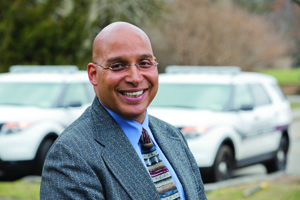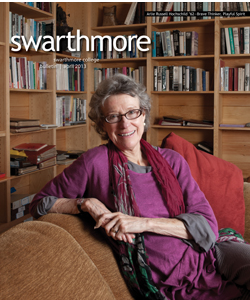Putting the ‘Public’ in Public Safety
Michael Hill brings a fresh and oh-so-Swarthmorean perspective to serving the campus community

Public Safety Director Michael Hill has taken his 30-person crew out of the office and into the community. “You have to do more than just ride around in a car,” says Hill, who hosts barbecues out of his office twice yearly for students. “You have to get out in the world and really engage the community.” Photo by Laurence Kesterson
Visitors to the Swarthmore campus often make the Welcome Center in the Benjamin West House their first stop. Helpful staff members, neat stacks of literature, and the faint hum of a police radio greet newcomers to campus. Often, they also encounter the Public Safety Department’s affable new director, Michael Hill.
An Army reservist for more than two decades and self-proclaimed cat person, Hill inherited two felines when he arrived at the College a year ago after nearly 25 years in public safety at Bryn Mawr. In keeping with the hominess of this bustling office, cat toys and food stand at the ready for a cherubic gray short-hair, Grima, named after Grimalkin, the feline friend of Benjamin West. Outdoor tabby Hemingway (aka Willets Cat) roams the campus freely but pops in for visits and plush accommodations when she’s hungry.
In his short tenure, the dapper Hill, commonly seen around campus in a blazer and tie, has become a visible community presence. He patrolled the campus and served food in Sharples during Superstorm Sandy, attends regular meetings with borough officials about safety and the community, and created a Public Safety Advisory Committee, which he says serves as his compass, “to make sure we’re doing the right things.” Hill is also known on campus for his dedication to physical fitness, which he sharpened in 2011 while serving in 100-plus-degree weather in Iraq. Be it a mid-July heat wave or a sleety January day, Hill can be seen charging along the paths during his noontime run through campus.
For all the Mayberry-esque charm of the Public Safety Office, Hill is gravely serious about the role that the department and his staff play in the larger operation of the campus. He emphasizes ongoing training for each of his staff members and has deepened the department’s role in students’ lives. Hill’s take on security is to help people help themselves—a tenet he’s instituted by initiating Rape Aggression Defense classes, which female students can take for academic credit; preaching resistance to complacency; and revitalizing the Adopt-a-Dorm effort, which pairs a member of his patrol staff with a specific residence hall to instill familiarity and trust.
Under the ever-watchful yellow eyes of Grima, Hill discusses the finer points of his public safety philosophy with staff writer Carrie Compton.
Briefly describe what your officers typically do in the course of the day.
One of the first things I did when I got here was tell my folks that we’re public safety, and we’re going to put the public in public safety. We don’t just lock and unlock doors. I have people out there who have bachelor’s and master’s degrees who are or have been firefighters, police officers, and emergency medical technicians. So the officers do everything from investigating suspicious people to providing medical care. We also conduct investigations, work with the Title IX coordinator, and serve as a liaison to local law-enforcement agencies. You name it, we handle it.
We’re also very service oriented. At places like Swarthmore, you can’t afford not to be. … As much as I’d like to think we can do it all in public safety, we can’t. We also need the support of the Swarthmore Borough Police Department, staff, faculty, students, alumni, and parents. You have to get out in the world and really engage with the community. Safety is a shared responsibility.
I always encourage people to check out our website, where we have our bios and photos. It’s important to know us, because having a conversation with Jimmy, or Kathy, or Tony, or Joe, for example—rather than “just” someone in a uniform—allows us to build relationships before actual situations arise.
What’s the most common issue you find yourself faced with on campus?
We’re fortunate to be a safe community, but that allows folks to take that safety for granted. Opportunity theft is a challenge. This can occur when students leave their laptops unattended in the library. If you leave something out long enough, someone’s going to take it. We are also an open campus without walls to prevent anyone coming in. There are people who know that. I don’t want people walking around afraid of other people, but everyone should remember that we are not immune from unpleasant realities.
And then there are party nights. We were all young at some point. Our students are smart, and we’re constantly engaging them in conversation about making smart choices. Whether it’s our office, the Dean’s Office, the Residential Life Office, etc.— everyone has the same message for the students: Make wise choices.
What goes through your mind from a public safety standpoint when you hear about things like the tragedy in Newtown, Conn.?
I think everyone who hears about that kind of tragedy is saddened and troubled. And of course, I think, “What would we do here? How can we prepare ourselves for it?”
We have a good response plan, but there’s always work to be done. You have to keep sharpening that tool. We meet weekly with the dean’s office, counseling and health center staff, and the drug and alcohol counselor. We talk about students who are in crisis, whether it’s academic, emotional, or something else. We also meet regularly with college administrators and borough officials to discuss safety on campus. I feel strongly that we have to work together before there is an emergency in order to prepare and serve our community.
How did Public Safety help keep the campus together during Superstorm Sandy?
We are more likely to face a weather event than any other kind of crisis. When we knew Hurricane Sandy was going to come, we strategized and worked with the administration to communicate with our students, the borough, and the rest of the community.
When the storm hit, my officers were out looking for things like downed wires and branches. Part of the challenge of a hurricane is to tell students to stay in but to go out yourself. I had been on campus only a few months when the storm came. I was very impressed to see how much the community came together, and I was very proud to be involved.
What advice would you like to give students to best keep themselves and the campus safe?
If you think something’s wrong, trust your instincts. That’s not to say that a [suspicious] person is a criminal, but you have to be engaged enough to sense if something’s wrong and trust yourself. We’re so good at rationalizing everything away and saying, “Oh, that person’s probably just visiting someone,” but sometimes they’re not. Make the phone call. Call us early and let us investigate. Also, travel with friends. And don’t leave alone. If you came with a friend, you leave with your friend.
In case of an emergency we use a system [that sends out] text messages and voice mail. Students should go to the link on MySwarthmore and make sure all of their information is correct.
Is there anything else you’d like to say about the role of public safety on a campus like Swarthmore?
I see many parallels between my military and campus public safety experiences. As a [former] drill sergeant, I dealt with young people who were usually smarter and younger, yet it was my role to teach as much as I could, so they’d be prepared. In public safety, we’re also teachers but outside the classroom. We sometimes talk about things that aren’t necessarily fun. That’s why, last semester, we hosted a barbeque and open house, and we’ll do another this spring. We’re also planning some study breaks later this spring. We’ll put ourselves in front of as many students, faculty, and staff members as we can to make sure people know us before they need us.
 Email This Page
Email This Page